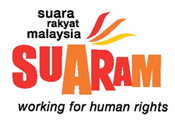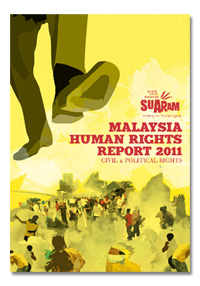WHY don’t civil society organisations register as societies in Malaysia, resorting instead to being listed as companies? And don’t Malaysians deserve to be suspicious of groups which are highly critical of the government and which are propped up by foreign funding?

According to both the state and the national media, Malaysians should be wary. A 21 Sept 2012 New Straits Times front-page story said it all — there is a “Plot to destabilise govt”. And those behind this plot are human rights groups — with Suaram in the forefront — , civil society organisations, and news portal Malaysiakini by virtue of the fact, it seems, that they receive foreign funding, among others, from no less than George Soros.
Don’t the government and the media have every right to hold these groups accountable in the same way that these groups often hold the state accountable? The Nut Graph speaks to political scientist Wong Chin Huat on the still-unfolding issue of Malaysian groups and their foreign funding, and the threats they potentially pose to the nation.
TNG: Why shouldn’t Suaram be investigated? If it’s registered as a company, shouldn’t it be treated under company law like any other company? Just because it works on human rights issues, should it be given special treatment?

The question we should first ask is: why did an NGO register as a company? A company may avoid tax if it is registered as an NGO. But what can an NGO gain by registering as a company? Nothing except for being registered!
The fact is registering an NGO under the Societies Act is made difficult and nearly impossible for civil society groups. Why? Because, to me, the Registrar of Societies (ROS) is loyal not to the country, its citizenry and the federal constitution which guarantees us freedom of association, but to the ruling parties. Groups — whether NGOs or political parties — deemed unfriendly to the federal ruling parties are often denied registration. For example, Parti Sosialis Malaysia was denied registration for years but the Sarawak Progressive Democratic Party (SPDP)’s registration was approved in days.
If Suaram should be on trial for using a roundabout way to register itself with the state, then the ROS and their political master, the home minister, should be in the dock for insulting the Federal Constitution and betraying citizens.
Yes, Suaram should certainly not enjoy any special discrimination. At the same time, if we want to talk about fair treatment all around, NGOs promoting human rights should enjoy as much freedom of association as those groups opposing human rights. Is that too much to ask of our prime minister, Najib the Moderate?
We often complain about government inefficiency. In the case of the ongoing investigation into Suaram, shouldn’t we applaud the government’s multi-agency efficiency?
I beg to differ about this allegation of general government inefficiency in Malaysia. This is slander by people who are jealous of our country’s achievement! I apologise if I, too, have unwittingly contributed to this misperception in the past.
Our government is certainly quite efficient when it wants to be. For example, in compromising justice; inciting hatred; acquiring lands; destroying forests; serving foreign interests; enriching cronies; violating human rights and finally; covering up all these acts through censoring the media and witch-hunting whistle-blowers. They are really very good in these core competencies.
Why can’t groups like Suaram, the Centre for Independent Journalism, and LoyarBurok, and movements like Bersih 2.0 source for funds locally? Why do they need to get foreign funding?
If you are deemed as friendly to the government, then you get easy donations from big businesses and of course, the government itself.
If you are deemed as anti-establishment, you may get donations from some other Malaysians but only if you grow big enough to be seen as a threat to the government. In that sense, large opposition parties and vocal ethno-religious NGOs generally have no big problems securing funding.
Funding problems are also solved when one is the target of a government witch-hunt. For example, Bersih 2.0 raised the money needed to organise the Bersih 2.0 and 3.0 rallies completely through public donations from Malaysians at home and abroad.
So, what kind of NGO work needs foreign funding? Those deemed threatening to the regime but which are not “sexy” enough to draw in pro-change public donations. For example, the funds Bersih 2.0 received from the National Democratic Institute for International Affairs (NDI) and Open Society Institute (OSI) was for a study on constituency re-delineation. At that time, Bersih 2.0 was still in its infancy and received little public attention.

Another good example of important NGO work that is not so appealing in the public’s eyes is Suaram’s annual human rights report, arguably one of the most important documentations of political development in Malaysia. How many of those who donated to Suaram for the Scorpene suit just to see Prime Minister Datuk Seri Najib Razak being dragged to a French court, forked out the same amount of money for the NGO’s annual publication?
Fundamentally, we should ask ourselves: if the work is good, what’s wrong if it’s funded by foreigners? For example, since Japan is the world’s third largest economy, should we begrudge the Japanese the foreign aid it received for the tsunami last year? Or, since our per capita GDP is only about 20% of Japan’s, did we have an ulterior motive to topple the government there when we donated to Japan?
What’s wrong if the Malaysian Aids Council, whose main funder is the Malaysian government, also received RM450,000 from Soros’s Open Society Foundation for HIV prevention programmes amongst high-risk groups like drug users? Is this the “evil Jewish financial speculator’s” plot to promote drug addiction by reducing its risk?
Doesn’t taking money from foreign sources leave these organisations vulnerable to being influenced and directed by foreign interests? How do we know that organisations which receive foreign funding are acting in Malaysia’s best interest and not the interest of their funders?
There are two angles in addressing the premise that receiving foreign money means vulnerability to foreign influence and even foreign control.
Firstly, if this were true, then the Malaysian government would be most guilty of being susceptible to foreign interests. How much in grants and cheap loans has our government received from the US, Japan, Europe and Arab countries alongside the World Bank and the Asian Development Bank? How do we know that our ministers and government officials have not sold out our national interest? Do they have a track record of integrity and intelligence?
Secondly, selling out your country can happen whether you receive money from or give money to foreigners. Take for example, the Lynas Advance Material Plant in Kuantan which receives a lucrative 12-year tax holiday for running a plant too costly to operate in Australia if it met environmental regulations there. This is like offering your home to your rich neighbour as their rubbish bin free of charge, instead of charging them a bomb as compensation. Hence, Lynas is virtually receiving foreign funding from the Malaysian government! So, do we think the Malaysian government is therefore in a position to take advantage of Australia or vice versa?

Now, between foreign bodies funding Malaysian NGOs, and the Malaysian government funding foreign corporations, which should we worry more about?
The best way to know whether an NGO, a political party or a government is selling out our national interest is to examine what they do and the impact of their work. The proof of the pudding is in the eating.
The media such as Utusan Malaysia, New Straits Times, The Star and Bernama Radio have been giving this issue a lot of coverage. Their coverage has been criticised as skewed. Aren’t they just playing their role in holding accountable organisations and movements which can influence people’s perception of government and potentially destabilise the government?
They would be if they are reporting facts as professional journalists do. When they report half-truths and lies without offering the involved parties the right to reply, calling them media is an insult to real journalists out there and to the trees that are cut down to print their propaganda. ![]()
Wong Chin Huat is a political scientist by training and was a journalism lecturer prior to joining the Penang Institute, a Penang government think tank. He is also a Bersih 2.0 steering committee member. If readers have questions and issues they would like Wong to respond to, they are welcome to e-mail editor@thenutgraph.com
Read previous Uncommon Sense columns


JW Tan says
The key issue is that all NGOs (and indeed the Malaysian government) should be open and transparent regarding their sources of funding so that the public can fairly assess the various incentives and influences that govern their behaviour. As you say, it’s not necessarily who paid for the work that matters, it’s what the work achieves.
stewoolf says
It pained me to read the angry tone in CH’s replies. Cross-border funding is part of globalisation. Nothing unlawful has been committed. Is Suaram being investigated on MORAL grounds??
I am doubtful Malaysiakini will get a printing permit despite the recent court victory. Suaram registering as a company is understandable.
As long as the current regime “dimanja-manjakan” by a segment of the [population], the government will be run in such a manner that even if we worked 48 hours a day, our productivity, and thus earning, will be so low, we would be dependent on foreign funds.
stewoolf says
Many years ago, a visitor approached me in a hush-hush manner to try out the pioneering technology under development in testing advanced compact electronic circuit boards. We could potentially cut down the test time from one hour to under a minute and the cost from US$1,000 to US$50! My colleague quickly recognised the module as a Raytheon-made Tomahawk missile control unit. More than one hundred were fired during the first Iraq war, mostly from submarines, at a cost of US$1.3 million a piece. By the time of the second Iraq war, the price dropped to US$1.05 million. It’s about US$850K now. Many countries, like the US, are expanding their defence capacities while we squander the modest budget that we can afford.
What’s more threatening to our sovereignty? Foreign funds to build an open society or corruption that weakens our nation’s defence?? How do we deal with a submarine that aims their Tomahawk missiles at our Twin Towers?? Send a Scorpene!?
Nohyid says
Yahudi! Yahudi! Yahudi!